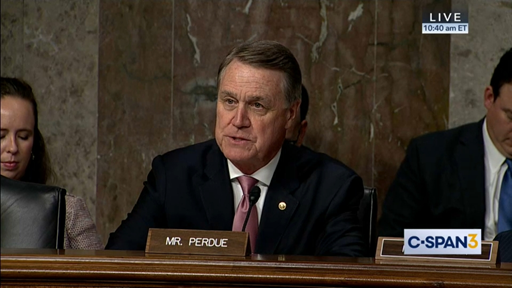
“A CR would send a terrible message to adversaries, allies, and most importantly, the soldiers, airmen, and Marines of the Joint Force.”
Senator David Perdue (R-GA), chairman of the Senate Armed Service Seapower Subcommittee, asked General Mark A. Milley, President Trump’s nominee to be Chairman of the Joint Chiefs of Staff, about the devastating impact a potential yearlong continuing resolution (CR) would have on the military.
Senator Perdue: “General Mattis said the greatest threat to national security is the federal debt. You talk about how consistent funding of the military could make a dramatic improvement, not only in readiness, but in moving to the new National Defense Strategy. Yet, there are some who are talking about a one-year CR for next year. It looks to me like there would be several ramifications:
- Pay Raise: “First of all, a one-year CR would delay the pay raise for our women and men that the President has asked for and even the U.S. House has asked for.
- National Defense Strategy: “It would delay implementation of the new National Defense Strategy for one year, which would mean we would be operating under a defense strategy that was developed three years ago by the prior administration.
- Readiness, Recap & Modernization: “It would slow down and reverse a lot of the benefits that you guys have gained over the last two years in readiness. It would absolutely slow down for one full year a lot of the programs that you have already approved – and the Senate has already approved – for recapping and modernization.
- Rationalization: “The other thing that we haven’t talked about is rationalization. The military has already found $4 billion of programs that you don’t want to spend money on, but a one-year CR would require you to spend that money.
- Supply Chain: “Last year was the first year in a decade that we did not ask the military to start the fiscal year under a continuing resolution. The supply chain got consistent, which is one way you guys have improved readiness over the last year.”
General Milley: “A one-year CR, at least to my knowledge, has never been done. So, we’d actually be in uncharted territory if we went there. CRs in general are a very ineffective and inefficient use of the taxpayers’ dollars, and we’re all supposed to be stewards of the taxpayers’ dollars. In my experience as chief of staff of the U.S. Army, CRs cause the price point of products and services to go up because you can’t guarantee a cash flow to the commercial partner you’re working with. I think a CR in general – whether one-year or one-month – is a poor way to do business. Having said that, I think that this CR would have a negative impact in terms of training, manning, equipping, procurement, modernization, spare parts, maintenance, end strength, pay and benefits, etc. Those are tangible pieces. But there’s an intangible as well, which is the message it sends to adversaries, allies, and most importantly, the soldiers, airmen, and Marines of the Joint Force. I think it sends a terrible message to them.”


Chattooga Local Government
Resolution Introduced Urging Accountability for Federal Immigration Detention Facilities
Chattooga Local News
Gesundheit! Here’s how to keep the sneezes to a minimum as pollen counts rise

Bulloch Public Safety
03/04/2026 Booking Report for Bulloch County

Chattooga Local News
Oversight Committee Releases Bill and Hillary Clinton Deposition Videos

Bulloch Public Safety
02/09/2026 Booking Report for Bulloch County

Bulloch Public Safety
02/16/2026 Booking Report for Bulloch County

Bulloch Public Safety
02/20/2026 Booking Report for Bulloch County

Bulloch Public Safety
03/02/2026 Booking Report for Bulloch County

Bulloch Public Safety
02/17/2026 Booking Report for Bulloch County





